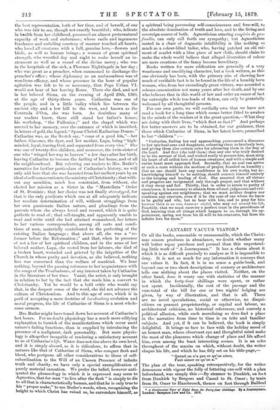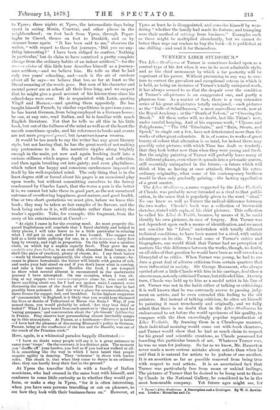CANTABIT VACUUS VIATOR.*
OF all the books, seasonable or unseasonable, which the Christ- mas season produces in abundance, we doubt whether many will better repay purchase and perusal than this unpretend- ing little work of " A Journeyman." It has a charm about it which it is as difficult precisely to analyse as it is impossible to deny. It is not so much for any information it conveys that one values it. In fact, it is in no sense a guide-hook, and beyond one or two short descriptions of scenery or architecture tells one nothing about the places visited. Neither, on the other hand, does it weary one with statistics of the manner in which the forty-four shillings were spent, or rather not spent. Incidentally, the cost of the passage and the sum-total of the bill for one or two nights' lodging are given, by way of illustration, and that is all. There are no novel speculations, social or otherwise, no disqui- sitions on peasant proprietorship, or capital and labour, no architectural criticism, no historical references, and scarcely a political allusion, while such moralising as does find a place in the narrative from time to time is on trite and familiar subjects. And yet, if it can be believed, the book is simply delightful. It brings us face to face with the holiday mood of an honest man, whose observant eye and thoughtful mind make the most of the pleasures which change of place and life afford him, even among the least interesting scenes. It is an echo throughout of the maxim on which, without doubt, the writer shapes his life, and which he has fitly set on his title-page,- " Quand on n'a pas ce qu'on aime, Flint aimer ce qu'on a."
The plan of the tour, speaking retrospectively, for the writer denounces with vigour the folly of fettering one-self with a plan beforehand, was simply this By steamer to Dunkirk, on foot from Dunkirk by Bergues and Cassel to St. Omer ; by train from St. Omer to Hazebrouck, thence on foot through Bailleul
• A Continental Tour of Eight Days for Forty-four di: Slings. By s Amur/man. London; Sampson Low and Co. 1878.
to Ypres ; three nights at Ypres, the intermediate days being spent in seeing Menin, Courtrai, and other places in the neighbourhood; on foot back from Ypres, through Poper- inghe to Cassel, thence on foot to Dunkirk, and so by steamer home again. " It has been said to me," observes the writer, " with regard to these flat journeys, ' Did you see any- thing interesting P ' I have been obliged to confess, ' Nothing iu particular,' but do claim to have contrived a pretty complete change from the ordinary habits of an indoor artificer,"—for the
vat us viator of this little tour describes himself as a journey- man artificer,—and we believe him. He tells us that he had
only two years' schooling, and—such is the air of candour about all he says—we believe that too, as far at least as the literal meaning of the words goes. But men of his character and mental power are at school all their lives long, and we suspect that he might give a good account of his leisure-time since his school-days were over. He is acquainted with Latin, quoting Virgil and Horace,—and quoting them appositely. He has taught himself French, by similar expeditions in previous years ; he has learnt German, from being employed in a German house ; he can, at any rate, read Italian, and he is familiar with much English literature. Not that he tells us all this in his little book, but out of the fullness of the mind as well as of the heart the
mouth sometimes speaks, and his references to books and events are not mere purpurei pauni, but irccOardviatcwra WA01;TOI.
It would be too much to say the writer has any great literary style, but not having that, he has the great merit of not making any pretensions to it. His narrative ripples along brightly enough in the main, yet now and again hushing itself into a serious stillness which argues depth of feeling and reflection, and then again breaking out into gaiety, and even playfulness, which reflect the happy and conscious carelessness imposed on itself by his well-regulated mind. The only thing that is in the least degree stiff or forced about his pages is an occasional play upon words, but without committing ourselves to the heresy condemned by Charles Lamb, that the worse a pun is the better it is, we cannot but take these in good part, as the not unnatural outcome of overflowing happiness, good-nature, and good health.
One or two short quotations we must give, before we leave this book ; they may be taken as fair samples of its flavour, and the book being such as it is, will stimulate rather than satisfy the reader's appetite. Take, for example, this fragment, from the story of his entertainment at Cassel :—
" At eight I came in for the evening meal. As most properly dis- posed Englishmen will conclude that I fared shabbily and lodged in dirty places, I will take leave to be a little particular in relating what I did get to eat, and where I was housed. The supper was laid at a little table sufficing for one, in a salle-a-manger, forty feet long by twenty, and high in proportion. On the table was a spotless cloth, on which lay a napkin equally fresh. They gave me an omelette cur fines herbes, in an oval dish, abundant fresh butter, in a shell-like piece of crockery, plenty of cheese, &c. I say fresh butter —made by themselves apparently, the churn was in a corner—be- cause in places hereabouts the butter will bristle with grains of salt, and make your hair stand on end if you don't know what is coming, and take a bite unawares. Besides the food, I p.m tempted to show what mental aliment is encountered in the unobtrusive journey I have attempted. On one occasion, when I was sit- ting at my supper, two coninzis-royageurs close by, who could not know anything about me, for I had not spoken since I entered, were discussing the cause of the death of William Pitt ; how that he had possibly been poisoned. And this was a place for accommodation, at three francs for supper, bed, and breakfast. In the highest empyrean of commercials' in England, is it likely that you would hear discussed the lives or deaths of Talleyrand or Baron von Stein ? Why, if you named them, you would probably be asked, Are they best fried or boiled ?' What I have heard from such quarters is that gas is used for 'eating purposes,' and conversation about the pie-biscuit ' (plebiscite) in France. Pray observe how gormandising almost inevitably surges up in this atmosphere. At Passau, at a beerhouse—Brauerei is better —I have had the pleasure of discussing Bismarck's policy in German. Passau, being at the confluence of the Inn and the Danube, was out of the reach of the Prussian stick."
Here, again, is a whimsical paradox happily illustrated :- "I have no doubt many people will say it is a great nuisance to carry your traps.' On the contrary, it is a distinct gain. The moment you shuffle cff ' your burden, you feel as if you had not walked at all. It is something like the way in which I have heard that people acquire agility in dancing. They 'rehearse' in shoes with leaden soles. The result is, that when they come to dance in an ordinary shoe, they can hardly keep their feet to the ground."
At Ypres the traveller falls in with a family of Italian musicians, who had crossed in the same boat with himself, and confesses to some little cariosity as to whether they would per- form, or make a stay in Ypres, "for it is often interesting, when you have seen persons travelling or out on pleasure, to see how they look with their business-faces on." However, at
Ypres at least he is disappointed, and.consoles himself by won- dering " whether the family had made its fortune, and tramping were their method of retiring from business." Examples such as these might be multiplied abundantly, but we cannot do better than urge our readers to buy the book—it is published at one shilling—and read it for themselves.



































 Previous page
Previous page